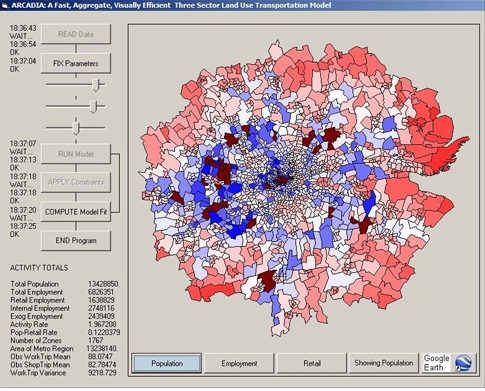
Urban areas are concentrations of vulnerability to climate change. Examples of impacts of climate change in urban areas include excessive heat, water scarcity and flooding.
Whilst it is impossible to attribute individual extreme events to climate change, recent events including the 2003 heat wave that struck Paris and other European cities, and hurricane Katrina in New Orleans have illustrated the potential for large scale weather-related disruption of urban function, from which it may take months or years to recover.
In recognition of the significance of climate change in urban areas, from the points of view of both adaptation and mitigation, in 2005 the Tyndall Centre for Climate Change Research launched a new research programme on "Engineering Urban Systems". Building on the previous success of the Tyndall Centre in interdisciplinary integrated assessment, the Tyndall Centre Cities Programme brought together research expertise from seven universities (four of which are represented in the ARCADIA project) and a high profile stakeholder group to develop an Urban Integrated Assessment Facility (UIAF) that simulates long term changes in urban areas and can be used as a platform for testing the effectiveness of adaptation and mitigation strategies.
The ARCADIA project will launch an ambitious new phase of development of the Tyndall Centre UIAF in order to understand better the vulnerability and resilience of urban areas.
The ARCADIA project is highly interdisciplinary and involves input from an influential group of stakeholders from business and local and central government, with interests in planning, infrastructure, the built environment and climate change adaptation and mitigation. This group will work with the research team to ensure that the project is orientated towards user needs. Indeed the first research task will involve close work with stakeholders to understand how the advance modelling tools being developed in the Tyndall Centre can best inform decision making.
The project runs from September 2010 to September 2012 and is supported by EPSRC as part of wider consortium run by Jim Hall at Oxford University.
- People
Professor Michael Batty
View Michael's profile
Send Michael an emailDuncan Smith
Professor Jim Hall
- Outputs
Batty, M., Vargas-Ruiz, C., Smith, D., Serras, J., Reades, J., and Johansson, A. (2011) Visually-Intelligible Land Use Transportation Models for the Rapid Assessment of Urban Futures, CASA Working Paper 163
Dawson, R., Hall, J., Barr, S., Batty, M., Bristow, A., Carney, S., Dagoumas, A, Evans, S., Ford, A., Harwatt, H., Kohler, J., Tight, M., Walsh, C., And Zanni, A. (2009) A Blueprint for the Integrated Assessment of Climate Change in Cities, in K. Tang (Ed) Green CITYnomics: The Urban War against Climate Change, Greenleaf Publishing, Chippenham, UK, 32-51.
- Impact
The ARCADIA project is divided into 6 tasks that define the various impacts of the project:
- Task 1 will deal with the planning of the project
- Task 2 will identify the various direct and indirect modes in which climate impacts disrupt urban function and will go on to examine potential adaptation mechanisms and barriers to adaptation.
- In Task 3, the Tyndall Centre will team up with the Climatic Research Unit at UEA and the Met Office Hadley Centre to develop new probabilistic scenarios for urban areas that are consistent with UKCIP08.
- Task 4 will model the relationship between climate impacts and the urban economy, in order to identify how the economy may be disrupted by climate change. By analysing change in the economy through time and interactions between economic sectors, we will understand better how the urban economy can be made more resilient.
- Task 5 will combine the economic model developed in Task 4 with a new model of the spatial planning of buildings and infrastructure in urban areas. As well as identifying concentrations of vulnerability, this will enable the simulation of potential redesign of the built environment under different scenarios of climate and other drivers such as employment and changes to the transport system.
- Task 6, the final research task, will, working with stakeholders, use the new understanding of the vulnerability of urban systems to analyse how adaptation of urban areas can enhance resilience over a range of timescales. The objective will be to make practical proposals for 'adaptation pathways' for cities over the 21st Century to respond strategically to the challenges of flooding, water scarcity and extremes of heat.
 Close
Close

